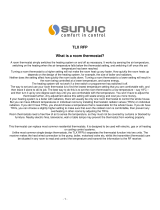
5
Transmitter
5.9 Remove the wall plate from the transmitter unit, by undoing the
retaining screws, and pivoting the bottom of the unit outwards.
The TRT037N transmitter body can then be lifted off.
5.10 Mark the position of the mounting holes on the wall using the wall plate
as a template. Drill out the mounting holes taking care to avoid any
joists, electrical cables or water/gas pipes that may be hidden beneath
the surface. Insert the rawl plugs into the holes.
5.11 Fix the wall plate to the wall using the correct mounting screws for the
rawl plugs installed. The retaining screws which secure the unit to the
wall plate should be at the bottom.
5.12 To insert batteries into the unit, access the battery compartment located
on the left side/rear of the unit. Use a small flat head screwdriver and
release the lug and lever out the battery compartment. Insert the 2 x
AA batteries (supplied) maintaining the correct polarity, as shown in the
base of the battery compartment. Push the battery compartment back
into place until clicks shut.
Battery compartment lug
Release the lug and
lever out the battery
compartment to the right
5.13 To reinstall the unit onto the wall plate, first ensure the wall plate
retaining screws are loosened enough to clear the TRT037N transmitter
body, then engage the top of the TRT037N transmitter onto the wall
plate retaining tabs, and push firmly downwards and then upwards.
There will be some resistance from the terminals.
5.14 Once in place, secure with the retaining screws making sure not to
over tighten.




















